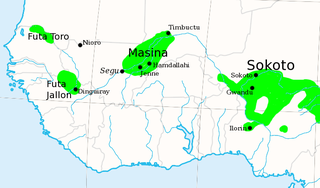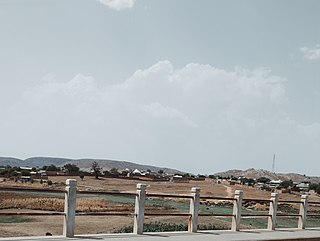Related Research Articles

Katsina is a Local Government Area and the capital city of Katsina State, in northern Nigeria.

Katsina State is a state in the northwestern geopolitical zone of Nigeria. Katsina State borders the Republic of Niger to the north for 250 km and the States of Jigawa for 164 km and Kano to the east, Kaduna to the south for 161 km and Zamfara to the west. States. Nicknamed the "Home of Hospitality", Both the state capital and the town of Daura have been described as "ancient seats of Islamic culture and learning" in Nigeria.
Alhaji (Dr) Mamman Shata MON was a Nigerian singer.

The Kingdom of Zazzau, also known as the Zaria Emirate, is a traditional state with headquarters in the city of Zaria, Kaduna State, Nigeria. The current emir of Zazzau is Ahmed Nuhu Bamalli CFR, who succeeded the former emir, late Alhaji Shehu Idris.
Daura is a town and local government area in Katsina State, northern Nigeria. It is the spiritual home of the Hausa people. The emirate is referred to as one of the "seven true Hausa states" because it was(along with Biram, Kano, Katsina, Zazzau, Gobir, and Rano), ruled by the descendants of Bayajidda's sons with Daurama and Magira . The University of California's African American Studies Department refers to Daura, as well as Katsina, as having been "ancient seats of Islamic culture and learning."
Faskari is a town and Local Government Area (LGA) in Katsina State, northern Nigeria. The population of the LGA was 125,181 as of 2003. The current Sarki (Emir) is Eng. Aminu Tukur Saidu, and the Executive Chairman is Honourable Bala Faskari, an APC member.

The Fulajihads sometimes called the Fulani revolution were a series of jihads that occurred across West Africa during the 18th and 19th centuries, led largely by the Muslim Fulani people. The jihads and the jihad states came to an end with European colonization.

Kazaure is an Emirate and a Local Government Area of Jigawa State, Nigeria. Its headquarters is in the ancient city of Kazaure.
Lere is a Local Government Area and town in the southern part of Kaduna State, Nigeria. Lere town is located geographically at the latitude of 10 degrees 39 North and longitude of 8 degrees 57 East. It is the headquarters of the Lere Emirate. The town and its environs have an estimated population of about 553,290 (2016). Lere Local Government has an area of 2,634 km2 and a population of 339,740 at the 2006 census. Its headquarters are in the town of Saminaka. The postal code of the area is 811.
The Suleja Emirate is a Hausa principality in what is now Niger State, Nigeria. The emirate was established as the Abuja Emirate during the 19th century, located just north of the site of the present-day federal capital city named Abuja. When the new city was established, the emirate and its capital were renamed the Suleja Emirate and Suleja. The emirate covers about 1,150 square miles of wooded savanna area. Suleja Emirate, Kontagora Emirate, Borgu Emirate, Agaie Emirate and Kagara Emirate were the major Emirates in Niger state.
The Daura Emirate is a religious and traditional state in Northern Nigeria, the Emir of Daura still rules as a ceremonial hereditary monarch, and maintains a palace. Muhammad Bashar became the emir in 1966, reigning for 41 years until his death in 2007, On 28 February 2007, Umar Faruk Umar became Emir of Daura succeeding Muhammad Bashar.

The Bauchi Emirate was founded by Yaqubu dan Dadi in the early 19th century in what is now Bauchi State, Nigeria, with its capital in Bauchi. The emirate came under British "protection" in the colonial era, and is now denoted a traditional state.

Alhaji Faruk Umar Faruk or Umar Faruk Umar is the 60th Emir of the Daura Emirate. The Emirate is based in the town of Daura in Katsina State, northern Nigeria.
The Kebbi Emirate, also known as the Argungu Emirate is a traditional state based on the town of Argungu in Kebbi State, Nigeria. It is the successor to the ancient Hausa kingdom of Kebbi. The Emirate is one of four in Kebbi State, the others being the Gwandu Emirate, Yauri Emirate and Zuru Emirate.
For the Arab Hutaymi tribe, see Sulluba
Ummarun Dallaje was the 39th Islamic Leader of Katsina, the first Fulani emir, as well as the patriarch of the Dallazawa dynasty. He became Amirul Muminin after the Jihad of Shehu Usman dan Fodiyo, succeeding Magajin Haladu, the last ruler of the centuries-old Habe dynasty, which founded by founded by Muhammadu Korau. Ummaru was succeeded by his son Saddiku.

The Sultanate of Kano was a Hausa kingdom in the north of what is now Nigeria that dates back to 1349, when the king of Kano, Ali Yaji (1349–1385), dissolved the cult of Tsumbubra and proclaimed Kano a sultanate. Before 1000 AD, Kano had been ruled as an Animist Hausa Kingdom, the Kingdom of Kano. The sultanate lasted until the Fulani Jihad in 1805 and the assassination of the last sultan of Kano in 1807. The sultanate was then replaced by the Kano Emirate, subject to the Sokoto Caliphate. The capital is now the modern city of Kano in Kano State.
Muhammad Dan Yaji, known as Muhammad Alwali II was the last sultan of the Sultanate of Kano. His reign coincided with a period of upheavals in Sudanic History that saw a series of religious Jihads waged by the Fula People. In 1807, after a protracted struggle with Fula clans, Muhammad Alwali was ambushed and assassinated at Burum-Burum in modern Kano. His death marked the end of the Kutumbawa line of Hausa aristocrats in Kano and the fall of the 800 year old Bagauda Dynasty.

The history of Katsina stretches over a millennium. It is part of the Hausa Bakwai states, believed to be founded by the descendants of Bayajidda according to legend. Throughout its history, Katsina has been governed by various dynasties, including the Wangarawa and the Dallazawa, and was a vassal to neighboring empires such as Songhai and Bornu.

The Dambazawa are a Fulani clan residing mainly in Kano State, Nigeria. They were among the key promoters, planners and executors of the Fulani Jihad in Kano, which took place between 1804 and 1807 under the leadership of Shehu Usuman dan Fodiyo. The clan was said to be the top financier of the jihad because it was said to be extremely wealthy at the time of the jihad. Other Fulani Clans that participated in the Jihad included: the Jobawa, the Yolawa, the Sullubawa, the Danejawa and others, as well as a contingent of the native Hausa people led by Malam Usuman bahaushe. Together they formed a formidable force and toppled the 158 year Kutumbawa dynasty led by its last ruler Muhammad Alwali dan Yaji dan Dadi bakutumbe who ruled between 1781 and 1806.
References
- 1 2 3 4 "Daura". Encyclopædia Britannica . Encyclopædia Britannica, Inc. Retrieved 2006-12-21.
- ↑ "Katsina State". Nigeria Direct. Federal Ministry of Information and National Orientation. Archived from the original on 2006-12-13. Retrieved 2007-01-20.
- ↑ "INEC registers 1.8m voters in Katsina". The Tide Online. Rivers State Newspaper Corporation. 2007-01-09. Archived from the original on 2016-03-03. Retrieved 2007-01-24.